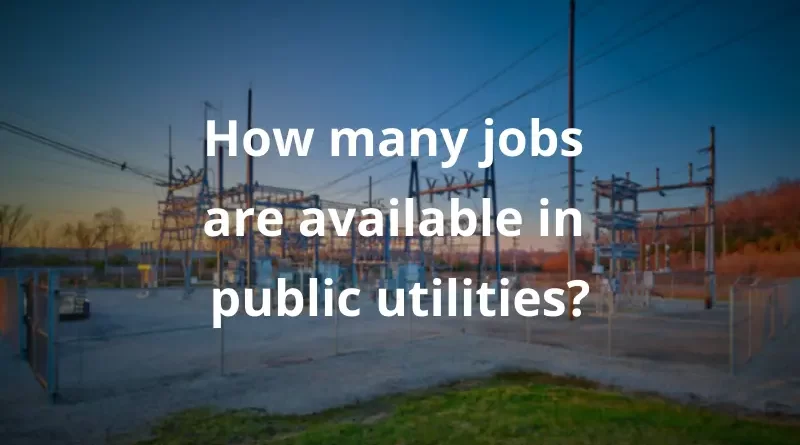How Many Jobs Are Available in Public Utilities?
In the modern job market, many seek secure and stable employment opportunities that promise a secure future. One industry that stands out in this regard is public utilities. If you’re curious about the many job openings within this sector, you’re in the right place. In this comprehensive guide, we will delve into the world of public utilities, exploring the variety of career opportunities it offers.
Public utilities encompass companies responsible for delivering essential services to the public, including electricity, gas, water, and sewage treatment. These services are pivotal in maintaining the smooth functioning of society and the broader economy. Often subject to government regulation, public utilities can be operated by both private and public entities.
Exploring Job Opportunities in Public Utilities
Let’s journey through the diverse employment landscape within the public utilities sector. Whether you’re an engineer, technician, or customer service enthusiast, there’s a place for you in this essential industry.
1. The Electricity Sector
The electricity sector represents a significant portion of the public utilities industry, focusing on generating and distributing electricity to homes and businesses. Here, you’ll find an array of employment options:
Engineers: At the forefront of the electricity sector, engineers are tasked with designing and maintaining the intricate infrastructure for generating and distributing electricity. Specializations within this field include electrical, mechanical, or civil engineering. Electrical engineers oversee electrical systems and equipment, while mechanical engineers manage mechanical equipment. Civil engineers handle physical infrastructure, such as power plants, transmission towers, and substations.
Technicians: These professionals are crucial for the sector’s day-to-day operations. Technicians specialize in installing and maintaining electrical equipment, including transformers, circuit breakers, and power lines. Their expertise can be further divided into electrical or mechanical technicians.
Customer Service Representatives: The face of the company, customer service representatives play a pivotal role in handling inquiries, addressing complaints, and resolving billing issues. Exceptional communication and problem-solving skills are essential in this role.
2. The Gas Sector
The gas sector, another integral part of public utilities, supplies natural gas to residences and businesses. It, too, offers a wide array of career opportunities:
Engineers: Gas engineers are responsible for designing and maintaining the infrastructure supplying natural gas. Specializations include mechanical, chemical, or civil engineering. Mechanical engineers oversee mechanical equipment like compressors and pipelines, while chemical engineers manage chemical equipment found in gas processing plants. Civil engineers handle the physical infrastructure, including gas storage tanks and pipelines.
Technicians: Similar to their counterparts in the electricity sector, gas technicians are responsible for installing and maintaining gas equipment such as pipelines and compressors. They may specialize as electrical or mechanical technicians.
Customer Service Representatives: Just as in the electricity sector, customer service representatives in the gas sector are essential for maintaining positive customer relations.
3. The Water and Sewage Sector
The water and sewage sector ensures clean water and efficient sewage treatment to households and businesses. It, too, offers a broad spectrum of job opportunities:
Engineers: Engineers in this sector are entrusted with designing and maintaining the infrastructure responsible for providing clean water and sewage treatment. Specializations encompass civil, environmental, or chemical engineering. Civil engineers manage physical infrastructure like water and sewage treatment plants, while environmental engineers focus on systems that safeguard the environment from pollution. Chemical engineers oversee chemical treatment processes.
Technicians: Technicians play a vital role in installing and maintaining equipment, such as pumps and filters, to ensure the efficient operation of water and sewage treatment facilities. They can specialize in areas such as electrical or mechanical techniques.
Customer Service Representatives: Like in the electricity and gas sectors, customer service representatives within the water and sewage sector handle inquiries, complaints, and billing matters, providing a vital link between the utility company and its customers.
What Do Public Utilities Workers Earn?
The public utilities sector is critical in society and delivers essential services to consumers. Governments at both the state and federal levels prioritize ensuring that utility workers are adequately compensated for their invaluable contributions.
- Electric power workers earn an average wage ranging from $28.54 to $49.14 per hour, contingent on their position and qualifications. The average annual salary in other sectors stands at $59,916.
Additionally, utility workers often receive attractive employee benefits, including union membership, medical insurance coverage, and retirement packages. The extent of these benefits depends on one’s job position and pay grade.
How Does Working in the Public Utilities Sector Benefit You?
An increasing number of job seekers are turning their attention to the public utilities sector, drawn by several compelling reasons:
1. Wage Fairness:
Compensation policies within the public utilities sector align with state and federal minimum wage requirements. This commitment to fair wages ensures that utility companies provide reliable and quality services to their communities, sustaining their operations.
2. Job Security:
Public utility services are deemed essential to communities, translating into job security for those employed in this sector. Utility companies prioritize retaining their employees to maintain uninterrupted service.
3. Additional Benefits:
Utility workers and their families benefit from medical insurance coverage, offering peace of mind regarding healthcare needs. Savings and retirement plans further provide financial stability, assisting workers in building a secure future. Depending on their positions and the industry, utility workers may also enjoy additional perks such as house or car allowances and paid vacations.
What Career Opportunities Are Available in Utilities?
The public utilities sector continuously evolves to meet the growing demands of expanding cities and advancing technology. Recent research highlights that the utility sector is undergoing significant transformation, adapting to the technological advancements of the modern era. This transformation necessitates the hiring of skilled workers for various utility services.
For instance, some of the promising career opportunities in the public utilities sector include:
- Water Resources Specialist: These specialists focus on developing innovative solutions for water generation and supply, ensuring a steady water supply for the state.
- Power Plant Engineers: Responsible for overseeing the maintenance of machines and equipment used in manufacturing and construction; these engineers play a crucial role in keeping appliances running efficiently.
- Pipeline Controllers: They maintain water and sewerage pipes to prevent disruptions and ensure consistent service.
- Power Transmission Engineers: These professionals design and install power transmission lines, crucial for maintaining a reliable electrical supply.
FAQs
A) Do Public Utility Jobs Pay Well?
Public utility jobs offer competitive compensation based on pay grade, skills, and experience. In addition to minimum wage standards, utility workers receive valuable benefits, including medical insurance coverage, retirement plans, and representation through unions.
B) The US Public Utility Sector: How Big Is It?
The US public utility sector is a significant driver of the nation’s economy, contributing approximately 10% to GDP. With growth trends predicting further expansion, this industry employs a substantial portion of the US workforce.
C) Alternatives To Public Utilities Jobs?
While the public utilities sector guarantees stable, long-term employment, some individuals may explore alternative industries that offer slightly higher compensation. Consider exploring opportunities in consumer services, capital goods, and real estate investment trusts (REITs).
Conclusion
In conclusion, the public utilities industry presents many job opportunities for individuals seeking stable and rewarding careers. Whether you aspire to be an engineer, technician, or customer service representative, there’s a place for you within the electricity, gas, water, and sewage sectors. These positions require varying levels of education and training, accommodating individuals with high school diplomas to advanced degrees in engineering.
As the demand for essential services continues to grow, jobs in the public utilities sector are poised to remain high, offering job security and stability for those embarking on careers in this vital industry. Don’t miss the opportunity to be part of a sector that contributes significantly to society’s well-being and advancement.
For more detailed information about job openings and career prospects in the public utilities sector, visit Public Utilities Careers.
Please note that this article provides information for informational purposes only and does not constitute professional career or financial advice.




